Prep: 30 mins
Cook: 0 mins
Pickling: 15 mins
Total: 45 mins
Servings: 16 servings
Yield: 32 ounce jar
Pikliz is the most popular relish and condiment in Haiti. That spicy slaw made of shredded green cabbage, scallions, carrots, and onions with a burst of acidity from the sour orange or the mixture of lime and vinegar, and a kick of heat from the Scotch bonnet or habanero pepper can transform any dish.
How To Use Pikliz
Pikliz is very versatile. It goes over every dish, snack, burgers, hotdogs, pizza, you name it, for a generous punch of flavor and spice. Pikliz transcends cultural backgrounds to throw a party in anyone's palate that eats it.
Fried Foods Love Pikliz
In Haiti, pikliz is sold on every corner on top of fried foods that Haitians call fritay in Haitian Creole. In the streets of Haiti’s capital, Port-au-Prince, when the pinch of hunger hits, a fritay vendor is always nearby on a corner or in front of their house with a tray of assorted fresh-from-the-oil fried goods like plantains, dumplings, slices of breadfruit, sweet potatoes, and taro root fritters that one can pick and choose from with a blessing of pikliz on top.

Pikliz Variations
The pikliz recipe differs slightly from house to house or from region to region. Some people pound chicken bouillon cubes and wash the powder down with a mixture of sour orange and lime juices into the shredded mix of veggies. Other people use sour orange juice only and some others use lime juice only as their acidic ingredient.
In my house, particularly when I was growing up, my father’s garden flourished with sour orange and Scotch bonnet peppers of all colors, and vinegar was not a popular ingredient in my family; therefore, the adult making the pikliz would use fresh sour orange juice picked from our backyard.
Tips for Making Pikliz
- Shredding the cabbage—You can shred the cabbage by hand with a sharp knife or with a mandoline slicer. Just watch those fingers!
- Use nonreactive tools—Because this is a very acidic condiment, use a glass bowl and storage container, a stainless steel or silicone spoon for mixing. Using tools made from aluminum, tin, or copper can cause those tools to discolor and can lead to off flavors in the pikliz.
- What kind of salt to use—Fine sea salt works best in this recipe, but you can substitute an equal amount of Morton kosher salt or 1/2 cup Diamond Crystal kosher salt. The only salt to avoid is iodized salt as it will compromise the flavor.
Make Ahead
Pikliz lasts a long time in the fridge and can be made 1 to 2 weeks ahead of when you’re planning to serve it.
“The absolute freshness and bite of the sour spice of pikliz is a unique flavor suited especially well for complimenting oilier savory dishes. It’s a good make-it-and-forget-it kind of side as long as you store it properly.” —Noah Velush-Rogers
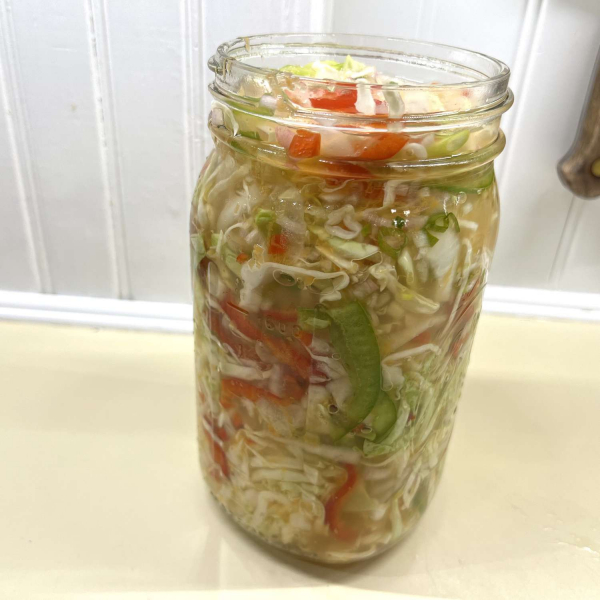
A Note From Our Recipe Tester
Ingredients
-
4 cups shredded green cabbage
-
1/4 cup grated carrots
-
1/2 medium yellow onion, thinly sliced
-
1 medium or 2 small shallots, finely chopped
-
1 Scotch bonnet or habanero pepper, finely chopped
-
2 medium scallions, thinly sliced
-
1/2 medium green bell pepper, thinly sliced, optional
-
1/2 medium red bell pepper, thinly sliced, optional
-
3 red radishes, thinly sliced, optional
-
2 cups distilled white vinegar
-
5 tablespoons freshly squeezed lime juice
-
1/4 cup fine sea salt (do not use iodized salt)
Steps to Make It
-
Gather the ingredients.
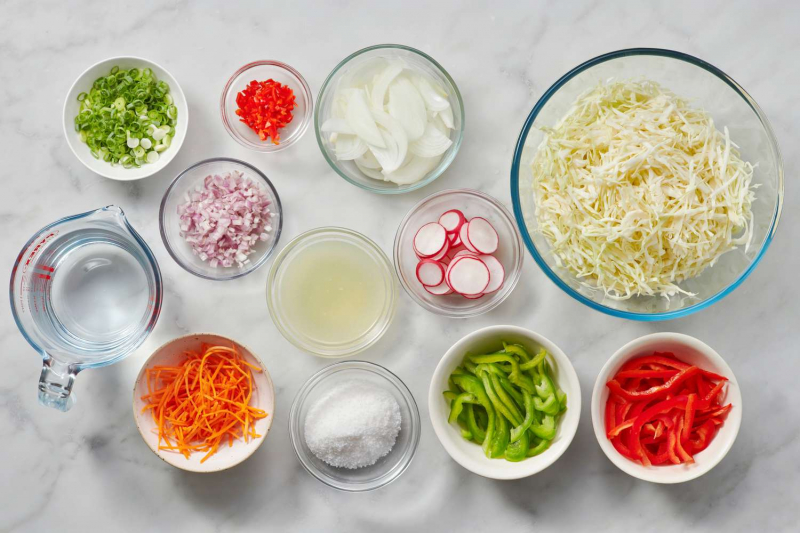
-
In a large bowl, place 4 cups shredded green cabbage, 1/4 cup grated carrots, 1/2 medium yellow onion, thinly sliced, 1 medium or 2 small shallots, finely chopped, 1 Scotch bonnet or habanero pepper, finely chopped, and 2 medium scallions, thinly sliced.
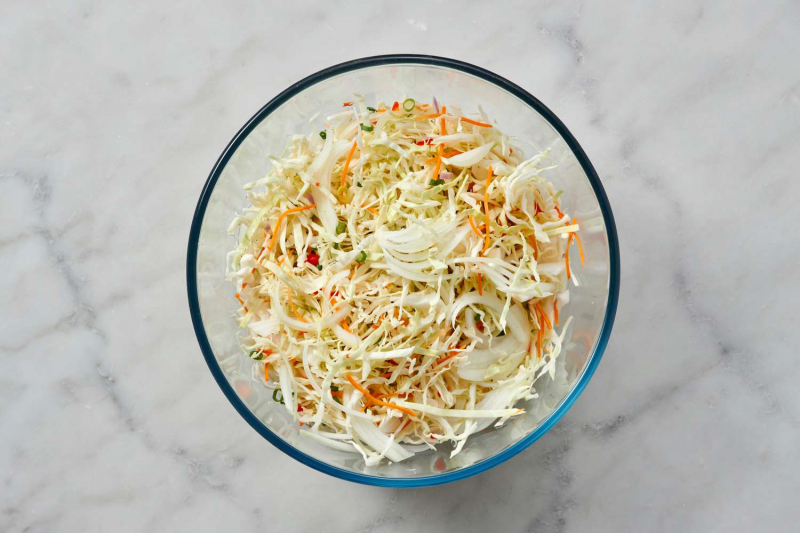
-
If desired, add 1/2 medium green bell pepper, thinly sliced, 1/2 medium red bell pepper, thinly sliced, and/or 3 red radishes, thinly sliced.
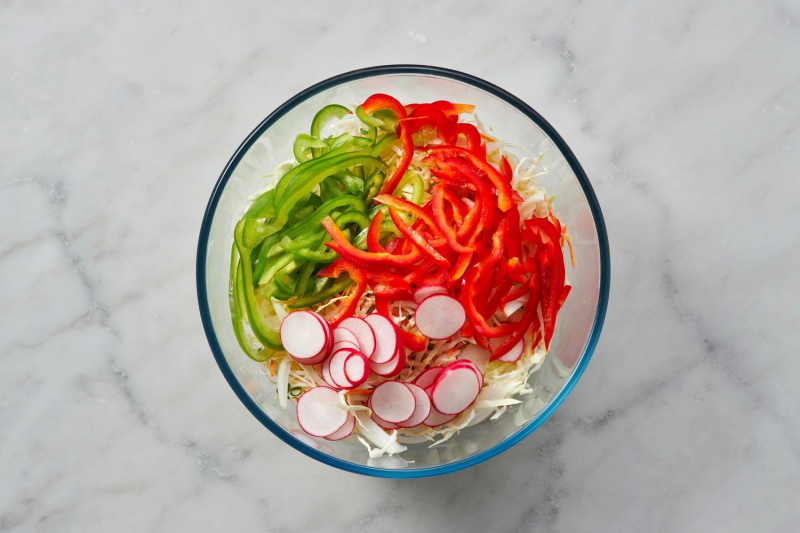
-
In a large measuring cup or medium bowl, stir together 2 cups distilled white vinegar, 5 tablespoons freshly squeezed lime juice, and 1/4 cup fine sea salt with a plastic or metal spoon (not wooden). Make sure the salt is dissolved.
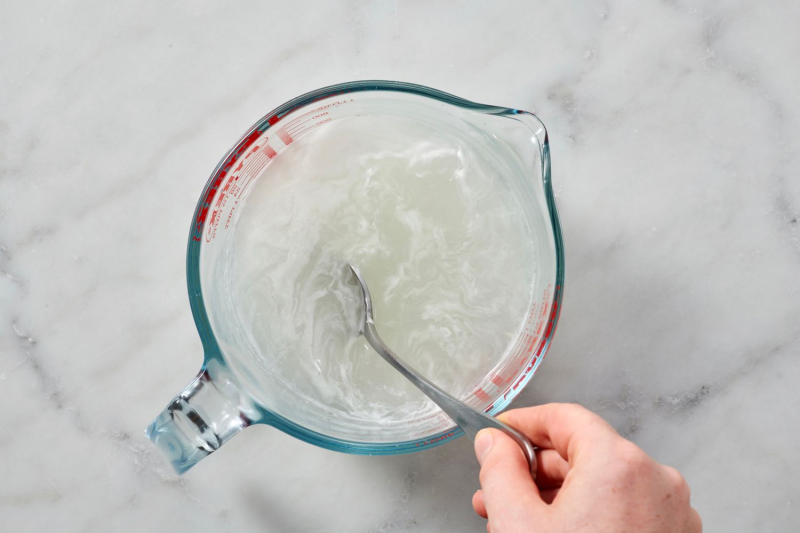
-
Pour the vinegar mixture over the veggie mix and let sit for at least 15 minutes before serving.
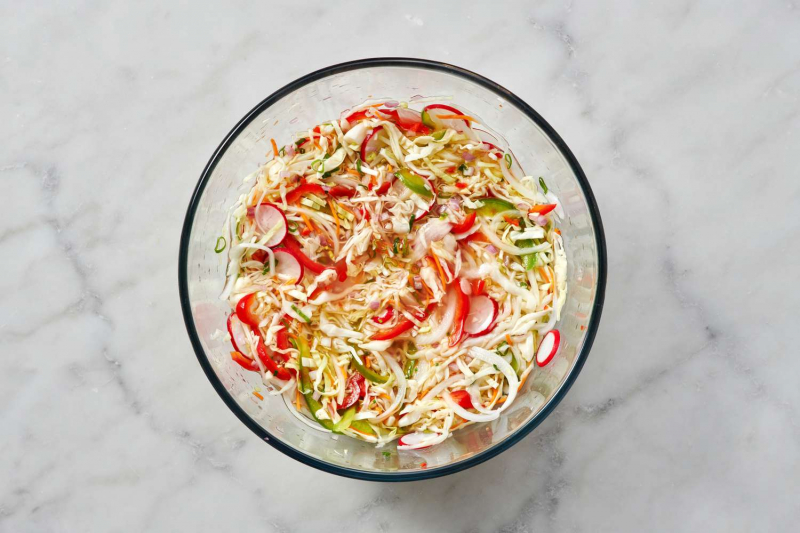
How To Store
If you’re taking the pikliz to an event, store in a glass bowl in the fridge for a day or two. If you intend to keep it in your fridge and eat it when you want, store it in a mason jar. Pikliz, when stored in the fridge and in a glass container, is good for up to a year. Be sure to add enough pickling solution to the vegetables so they’re completely submerged.
Feeling Adventurous? Try This:
- Make your pikliz colorful!—You can add different colors of bell peppers, thinly sliced, to the mix of veggies for a colorful pikliz. In Haiti, green and red bell peppers were the most popular when I was growing up and the adults in my life always used these.
- Add a savory flavor—Add a chicken bouillon cube or a teaspoon of bouillon powder to the vinegar mixture for an irresistible savory flavor.
- Make it fiery—If you love hot foods you can always add more Scotch bonnet or habanero to your pikliz. Just keep in mind that as it sits and the flavor equalizes the pikliz will become hotter.
| Nutrition Facts | |
|---|---|
| Servings: 16 | |
| Amount per serving | |
| Calories | 21 |
| % Daily Value* | |
| Total Fat 0g | 0% |
| Saturated Fat 0g | 0% |
| Cholesterol 0mg | 0% |
| Sodium 42mg | 2% |
| Total Carbohydrate 4g | 1% |
| Dietary Fiber 1g | 4% |
| Total Sugars 2g | |
| Protein 1g | |
| Vitamin C 20mg | 102% |
| Calcium 25mg | 2% |
| Iron 0mg | 1% |
| Potassium 115mg | 2% |
| *The % Daily Value (DV) tells you how much a nutrient in a food serving contributes to a daily diet. 2,000 calories a day is used for general nutrition advice. | |
